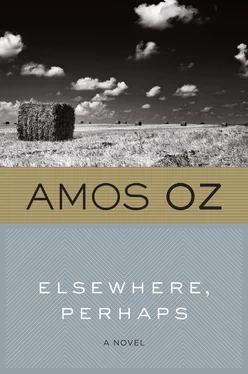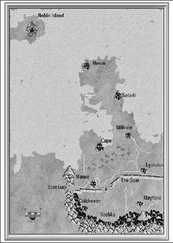Nehemiah suggested a short tour of the city. Zechariah agreed. But the friendship between the brothers was disrupted once more when Zechariah hailed a taxi and continued to ply his brother with costly amusements. Nehemiah was annoyed, but he did not manage to deprive Zechariah of the dominant role that he had discreetly usurped. At the end of their tour, Siegfried announced that our capital was a spiritual, poetic town, with very picturesque quarters.
Nehemiah suggested that his brother stay the night with him. To their mutual relief, however, he had to return to Tel Aviv the same day on business. And from Tel Aviv he intended to hurry straight back to Metsudat Ram. He had already decided to stay there until he had brought the problem to a satisfactory conclusion and rescued his brother Ezra. The two brothers parted with an embrace. They kissed each other on both cheeks. Nehemiah urged his brother to act straightforwardly and wished him luck. His heart, needless to say, was heavy.
Zechariah returned to Metsudat Ram, having completed his business and fulfilled his obligations to his elder brother. We were not pleased to see him back. The man was planning something. We suspected his motives. He did not inspire us with confidence. He lacked frankness. There were some who considered that he was not here on his own account, but that he had been sent by our ex-comrade Eva. Fruma Rominov, as usual, gave pointed expression to the general feeling:
"The man reminds me of a pimp."
Ezra Berger had resumed his double burden of work. He now spent almost half his hours in the cab of his truck. He also spent some time with his friends the fishermen in Tiberias. He no longer saw Noga. Perhaps he was avoiding her, or perhaps she was hiding from him. Or perhaps Herbert Segal was right when he said that they were kept apart by a common sense of guilt.
Noga worked five hours a day, as was the rule for boys and girls of her age during the school holidays. She helped Herzl Goldring with his gardening. Herzl Goldring is a bitter man, given to outbursts of fierce rage. But he treated Noga Harish with remarkable gentleness. He was not even strict about the hours she worked. If she arrived late or left early, Herzl saw and heard nothing. As they bent together over a shrub that needed trimming, he would try to amuse her with stories of her childhood. Herzl's daughter, who had died in infancy of diphtheria, had been born at the same time as Noga. He remembered the two girls when they were a year old sitting in a playpen, playing with colored bricks. He recalled the scene with complete equanimity, as if he were seeing it in the present, as if nothing had happened since. His way of recalling scenes from the past wrung Noga's heart. He remembered the colors of the bricks. He had painted them himself. A blonde head pressed against a dark head, curls touching curls, two beautiful little girls, Noga, two very special little girls. But how could you possibly remember Asnat? You've forgotten.
One day in July Fruma Rominov stopped Noga Harish outside the clothes store and said to her:
"You're beginning to bulge. Which month are you in? Third? Fourth?"
Noga turned to leave.
"Wait, wait a moment. You haven't heard what I have to say."
"Not just now, please, Fruma."
"Be patient. Wait just a minute. You can't go and see your father at the moment. Right? No, of course not. So where do you go to have your afternoon tea? You don't? That's bad. You must look after yourself now. Plenty of fruit, plenty of fresh vegetables, plenty of dairy produce. Do you like cream cheese? You need to take in a lot of calcium. Yes. You know why I'm saying this. I thought, I wanted to suggest, perhaps you'd come and have tea with me in the afternoons. I'm always alone. I could make you a snack, the sort of food you need. For example, I can get hold of some malt beer. I'll explain to you some time why beer is important when you're pregnant. You could listen to the radio, too, with me, and even play the recorder. I'm not musical, but I've never been averse to listening to a tune or two. You mustn't give up playing the recorder. Men may betray you; things are always faithful. That's life. So come around five o'clock. If you like, you can help me with the ironing, too. For your sake, not mine."
Noga thanked Fruma, but declined her offer. She preferred to sleep all the afternoon. She felt very tired these days. It must be the heat. Anyway, she would bear in mind what Fruma had said. Hurriedly, she turned her back, because her eyes were brimming. She had always been taught that warmheartedness and consideration were the opposite of malice, as day is the opposite of night. And now Fruma.
Herbert Segal held a meeting of Noga's class to discuss the matter with them. I want to consult you as people with experience of life. I haven't come here to make a speech. I've come to exchange ideas. I want you to know that I have called this meeting on my own initiative, without consulting the education committee. Our discussion will remain strictly between ourselves. You won't embarrass me. I trust you. I know a hint will suffice. Good. Let's begin. Our subject is the predicament of your friend Noga. No, that's not right. The predicament is your predicament. Our predicament.
To express what he had in mind, Herbert had to explain two notions. He explained to the children the meaning of "tragedy" and the meaning of "tact." With the aid of these two terms he initiated a subdued, rather solemn discussion. The conclusion was voiced by the children. Herbert accepted it. Noga must not be victimized. We must not behave like a mob gloating over someone else's distress. The solution was not artificial sympathy. That kind of sympathy was more hurtful than outright insults. But she must not be victimized. Whether or not she was responsible for her fate, she was suffering. We must be sensitive to her suffering. We must, in Herbert's phrase, exercise tact. And in his opinion, incidentally, the question of responsibility was not, generally speaking, a simple one. It was a philosophical problem.
Herbert Segal is a remarkable man. His words took effect. There were no more scornful or sarcastic comments. Perhaps Oren's serious remarks helped to damp down the general feelings. Dafna Isarov treated Noga as if she were ill. She walked on tiptoe in their shared room. It was not everyone who had the fortune to live with a girl who could be the heroine of a sad novel. Dafna was conscious of the responsibility that Herbert had impressed on the group, and especially, of course, on her.
As for Oren, he got into a fierce fight with an older boy, who was serving in the army, because the latter had dared to say to him sarcastically that the Berger family was about to celebrate a happy event, the birth of a new uncle for little Danny. Oren did not give a virtuoso performance. There was no exhibition of feints and subtle stratagems. He fought straightforwardly. He went straight to the point, to the disappointment of his supporters and detractors alike, and delivered a brutal kick to the most sensitive point.
He did not hate Noga. We need not weary ourselves with explanations. One day he slipped her a note folded up into a small wad, which said: Noga youre right if thats what you feel then you must do it because you must do what you feel not what other people feel your friend OC
Either because he felt like it, or prompted by dark influences, Oren drowned Mendel Morag's favorite cat. With an army dagger he removed the skin from the body, salted and dried it, replaced the eyes by green marbles, and made it into a soft, furry rug for Noga's bedside. Needless to say, the girl rejected the gift. But it must be added that Oren bore her no grudge.
Again, at sunset, on one of the benches in the garden, the girl in a blue skirt and bright blouse and the visitor in a white shirt and an orange tie, with the picture of a well-known movie star printed on it.
Читать дальше












